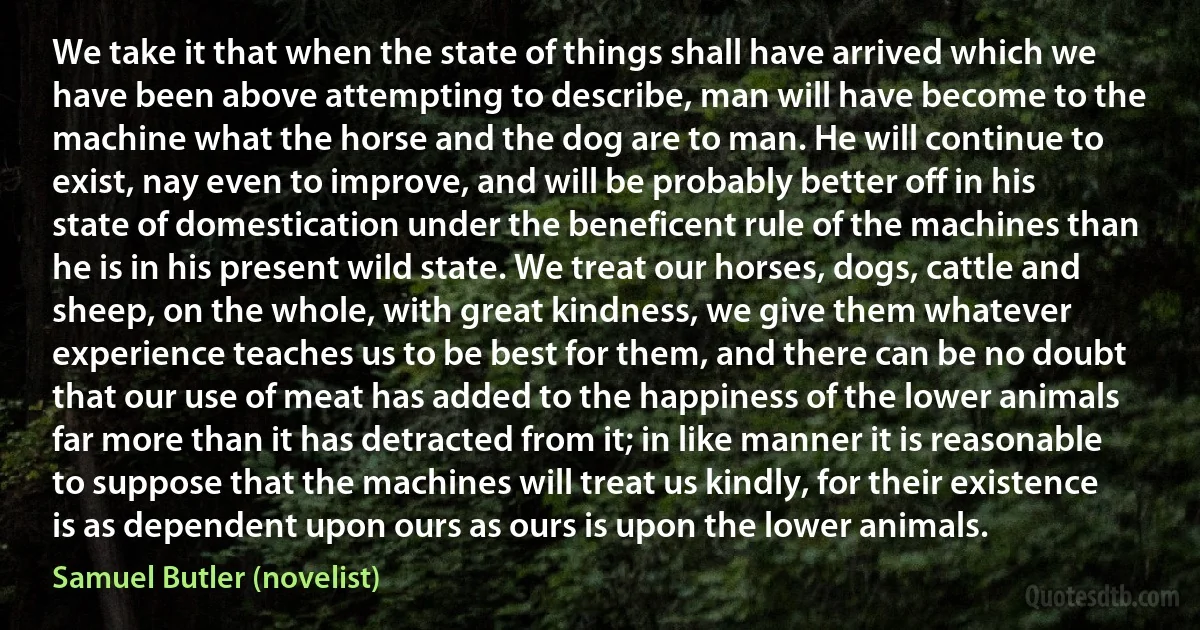
We take it that when the state of things shall have arrived which we have been above attempting to describe, man will have become to the machine what the horse and the dog are to man. He will continue to exist, nay even to improve, and will be probably better off in his state of domestication under the beneficent rule of the machines than he is in his present wild state. We treat our horses, dogs, cattle and sheep, on the whole, with great kindness, we give them whatever experience teaches us to be best for them, and there can be no doubt that our use of meat has added to the happiness of the lower animals far more than it has detracted from it; in like manner it is reasonable to suppose that the machines will treat us kindly, for their existence is as dependent upon ours as ours is upon the lower animals.
Samuel Butler (novelist)Related topics
above best cattle continue dog domestication doubt experience far great happiness horse kindness lower man meat off present rule sheep state suppose take treat under use whatever wild things dogsRelated quotes
It is not true, out of geometry, that the mathematical sciences are, in all their parts those models of finished accuracy which many suppose. The extreme boundaries of analysis have always been as imperfectly understood as the tract beyond the boundaries was absolutely unknown. But the way to enlarge the settled country has not been by keeping within it, but by making voyages of discovery, and I am perfectly convinced that the student should be exercised in this manner; that is, that he should be taught how to examine the boundary, as well as how to cultivate the interior. ...allowing all students whose capacity will let them read on the higher branches of applied mathematics, to have each his chance of being led to the cultivation of those parts of analysis on which rather depends its future progress than its present use in the sciences of matter.

Augustus De Morgan
If we recognize, following the materialist theories, that only the physical nature exist, and that man contain ("renferme", Fr.) no higher essence, divine, which, by one side of his being, raise (promote or improve...) him above his animal nature, it would be a question ("il ne saurait être question", Fr.) neither of obligation, nor of moral responsability; then the supreme good would consist for him, indeed, to satisfy his appetites and his natural inclinations (fondness or partiality, -"penchant", Fr.), to look for the pleasure and flee from (scud, shun, avoid, -"fuir", Fr.) pain. In this case, there could be neither religion nor moral, since religion is precisely what raise man above vulgar (or common, - "vulgaire", Fr.) reality, and that moral is the very negation of selfishness.

African Spir
If you are a Christian, no earthly city is yours. Of our City ‘the Builder and Maker is God.' Though we may gain possession of the whole world, we are withal but strangers and sojourners in it all. We are enrolled in heaven: our citizenship is there! Let us not, after the manner of little children, despise things that are great, and admire those which are little! Not our city's greatness, but virtue of soul is our ornament and defence. If you suppose dignity to belong to a city, think how many persons must partake in this dignity, who are whoremongers, effeminate, depraved and full of ten thousand evil things, and at last despise such honour! But that City above is not of this kind; for it is impossible that he can be a partaker of it, who has not exhibited every virtue.

John Chrysostom
The chief distinction in the intellectual powers of the two sexes is shewn by man attaining to a higher eminence, in whatever he takes up, than woman can attain - whether requiring deep thought, reason, or imagination, or merely the use of the senses and hands. If two lists were made of the most eminent men and women in poetry, painting, sculpture, music, - comprising composition and performance, history, science, and philosophy, with half-a-dozen names under each subject, the two lists would not bear comparison. We may also infer, from the law of the deviation of averages, so well illustrated by Mr. Galton, in his work on 'Hereditary Genius,' that if men are capable of decided eminence over women in many subjects, the average standard of mental power in man must be above that of woman. ... Thus man has ultimately become superior to woman.

Charles Darwin
Such arguments ill become us, since the time of reformation came, under Gospel light. All distinctions of nations, and privileges of one above others, are ceased; Christians are taught to account all men their neighbours; and love their neighbours as themselves; and do to all men as they would be done by; to do good to all men; and Man-stealing is ranked with enormous crimes. Is the barbarous enslaving our inoffensive neighbours, and treating them like wild beasts subdued by force, reconcilable with all these Divine precepts? Is this doing to them as we would desire they should do to us? If they could carry off and enslave some thousands of us, would we think it just?-One would almost wish they could for once; it might convince more than Reason, or the Bible.

Thomas Paine
